Leak Detection & Repair
Leak detection is part art, part science. Modern leak detection systems use advanced acoustic, infrared, and pressure sensors to locate even minor leaks.
That’s the science.
The art is in knowing where to look. A leak that appears outside may be hiding deep within a wall, posing an imminent threat of flooding.
That’s where our experience comes in. Our certified technicians have seen it all and know how to find even the most elusive leaks.
Once we’ve found the leak, we’ll give you a complete repair estimate and talk about any potential risks and inconveniences, such as temporarily shutting off your water service.
Our leak detection services are free, if you hire us for the repair.
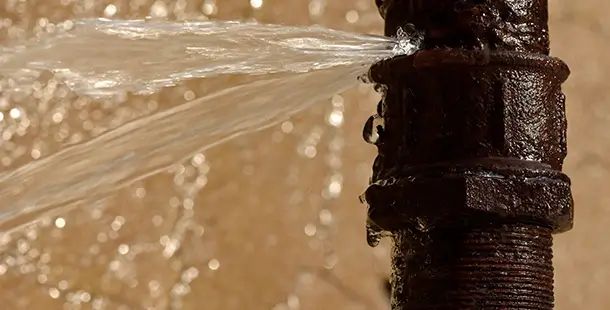
Don’t Delay: Call Us If You Suspect a Leak
Water damage, including damage from leaks, is one of the leading causes of property loss.
Early leak detection is critical to reducing harm. Don’t wait until you see a puddle to take action. Call us immediately if you suspect a leak, even if you can’t see clear evidence.
We’re available 24 hours a day, seven days a week, to take your call and dispatch one of our certified technicians to your home or business.
Signs of a Water Leak
- Dripping noises
- High water bills
- Sudden raising of floor or tile
- A sudden decrease in water pressure
- Discoloration on ceilings or walls
- Brown or yellow patches of grass in your yard
- Discolored tap water
- Wet spots on the floor
Leaks in water lines may go unnoticed because they’re behind walls or underground. But when a damaged pipe breaks, a slow leak can flood your home or business in minutes.
Signs of a Water Heater Leak
- Rusting on the outside of the water heater
- Water pooling around the base of the water heater
- Unusual noises coming from inside the water heater
- A sudden decrease in hot water pressure
- Dripping sounds coming from the water heater
- Moldy smells from the water heater
Water heaters last an average of 10 years. If yours is starting to show its age, it may be time to replace it before it breaks and causes extensive water damage.
Signs of a Toilet Leak
- Rusted nails or screws near the base of the toilet
- Moldy or sewer gas smells coming from beneath the bathroom sink
- Sudden raising of floor or tile
- Unusual noises coming from the toilet pipes
- Water on the bathroom floor, even when other plumbing fixtures haven’t been used
Most toilets last for many years without giving their owners any trouble. But like all plumbing fixtures, they eventually wear out and must be replaced.
Signs of a Sewer Leak
Sewer leaks are closely related to toilet leaks; however, a sewer leak can occur anywhere in your sewer lines. The good news (if there is any) is that you may be able to detect a sewer leak detected before a toilet leak occurs.
You may notice:
- Water backing up into your shower or tub when you flush the toilet
- Foul smells coming from your drains or toilets
- Gurgling sounds coming from your drains
- Slow-draining sinks or toilets
If you suspect a sewer leak, call us immediately. Sewer leaks pose a serious health risk and can wreak havoc on your home.
Signs of a Gas Leak
Natural gas is odorless. Utilities add a chemical that smells like sulfur or rotten eggs to serve as a warning in case of leaks. If you notice this odor, leave the building immediately. Call your utility company and Orange Coast Plumbing from a safe location.
Other signs of a gas leak include:
- Hissing or whistling sounds near a gas line
- Soap bubbles in the water near a gas line
- Bubbling in the dirt around a gas line
- An orange or yellow flame on your stove instead of blue
- Soot around a natural gas appliance
- Dead houseplants
- Burning sensations on the skin
- Nausea and dizziness
Your utility company is responsible for outdoor lines. They’ll shut off the gas and repair the line if they locate a leak. Once their work is complete, an Orange Coast technician can inspect your indoor lines.
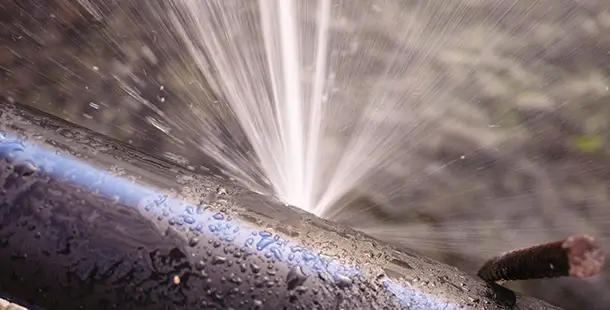
Slab Leak Detection
A slab leak occurs beneath or inside the foundation of a structure, making it hard to detect. Over time, it can crack or elevate a portion of your foundation, undermining its ability to support the weight of your home.
Repairing Slab Leaks
There are three possible approaches for repair. We always start with the least invasive and destructive approach.
1. Dig a hole through the concrete straight down to the leak.
We reach through the hole with precision instruments, repair the leak, then seal the hole with concrete. This method works best when there’s only one leak and little chance of a second leak developing.
2. Use a jackhammer to dig up the portion of your foundation at risk of developing leaks.
We remove the damaged section of the pipe, replace it, and seal the hole with concrete. This method takes patience, many hours, and careful planning. It’s the most invasive and expensive.
3. “Cured-in-Place-Piping,” or sliding a camera into the damaged pipe.
After cleaning the pipe, we coat the interior with high-quality resin. We force compressed air into the pipe, pushing resin into the cracks and plugging all leaks. Even if the old pipe forms new cracks, they won’t affect water flow because the new resin lining inside the old pipe remains intact.
We always inspect our repairs with sewer and drain cameras to ensure that you have no further issues.
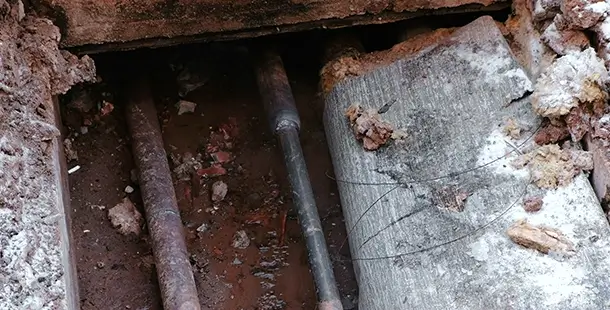
Broken Water & Sewer Pipes
When a damaged pipe breaks, a slow leak can burst into a flood.
Significant property damage is likely. You could be without water for days or weeks while insurance claims are processed and repairs are underway. Even with special equipment, it may take two weeks or more to dry floors and walls to the point where repairs can begin.
Broken sewer pipes are hazardous. They can spew sewage and other contaminants into your home or business, posing a severe health risk and requiring extensive cleanup.
Maintenance Is the Best Leak Prevention
Regular plumbing maintenance is critical to catch leaks before they wreak havoc. With our plumbing maintenance plan, you get:
- Regular inspection of all plumbing pipes and fixtures
- CCTV drain and sewer inspection
- Regular drain cleaning
- Water and sewer line repair and replacement
- Hydro jetting and sewer line cleaning
- And more.
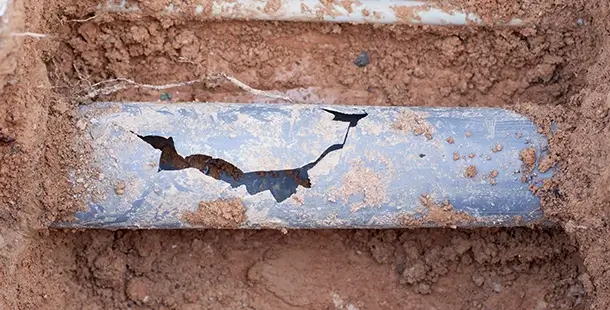
Leaking Natural Gas Lines
While most new buildings in Orange County are all-electric, many older homes and businesses still use gas heaters, furnaces, and other appliances. Commercial chefs cook with gas almost exclusively.
Leaking gas is extremely dangerous. The fumes are explosive; inhaled too long, they can be deadly. If you smell natural gas, leave immediately and call your utility company. Don’t turn any lights on or off, use a phone, or do anything that could create a spark.
Don’t attempt to turn off the gas yourself. Only a trained professional should shut off the gas line, after which an Orange Coast Plumbing technician can repair or replace the damaged pipe.
It may surprise you that plumbers are among the first responders for gas leaks, but we deal with all kinds of leaks and pipes. The fittings and seals on gas pipes are similar to those on water and sewer pipes.
Again, an ounce of prevention goes a long way. Our maintenance plans are flexible and tailored to your needs.
Sign up with us for regular maintenance, and we’ll inspect and repair all pipes in your building — water, sewer, and gas — to prevent problems before they start.
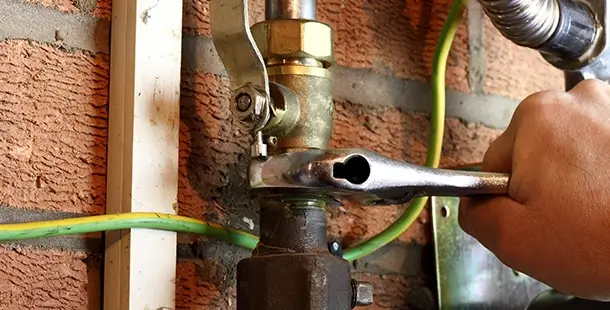
Frequently Asked Questions about Leak Detection & Repair
Can you fix a leaky pipe without replacing the pipe?
Yes. In many cases, we can fix the leak without replacing the pipe. Our team uses the latest plumbing technology and is trained in various repair methods, including spot repairs and cure-in-place relining.
Can a water leak stop on its own?
No. Water leaks don’t stop on their own and can quickly cause extensive damage. Call a professional at the first sign of any water leak, no matter how small.
Can a leak cause a pipe to burst?
Yes. Leaks can weaken the pipe structure, making it more prone to breakage. In addition, the pressure from the water or sewage inside can cause a weakened section of pipe to fail, leading to a burst.
How do I find out where a leak is coming from?
We use various technologies to locate leaks, including infrared cameras, acoustic listening devices, and pressure testing. These methods allow us to pinpoint the exact location of the leak quickly and accurately.
How do you find a leak in a hidden pipe?
We use a combination of tools to locate hidden and underground pipes. This includes sewer cameras, acoustic listening devices, and pressure testing. We also use special mapping software to accurately represent the location of all underground pipes to pinpoint any leak.
Does my homeowner's insurance cover a water leak?
That depends on the policy. Generally, most policies cover water leaks due to sudden and accidental damage. However, you should check with your insurance provider directly to find out what is covered and what isn’t.
Do I need a permit for leak repair?
In some cases, you may have to obtain a permit from the local authority before repairing a leak. This is especially true for leaks in public areas or sewer and gas lines.
How do I know if pipes are leaking under the house?
Look for visible signs such as wet spots on the floor, discolored walls, or an unexplained puddle of water. You can also use a moisture meter to detect increased humidity in some regions of the home. If all else fails, calling in a professional plumber to inspect the pipes is the best way to confirm whether or not there is a leak.
Who's responsible for water leaks on my property?
Most of the time, it’s up to the property owner to detect and repair any water leaks on their property. Your landlord or tenant may be responsible if the leak is due to a malfunctioning appliance or other equipment.
Are house leaks common?
Leaks are surprisingly common in older homes, especially those without regular maintenance. This is why it’s essential to inspect your plumbing regularly for any signs of damage or leaks.
I think there's a leak in my home, but I'm not sure. What should I do?
We have specialized equipment to help us detect leaks, even small ones. Don’t wait for a leak to become a flood. Call us.
Can a leak cause mold?
Yes, high humidity encourages mold growth. Mold can be difficult to remove, so it’s important to act quickly if you notice any signs of a water leak.
How can I prevent leaking pipes?
The most effective way to prevent leaks is to have your plumbing regularly checked and maintained by a professional plumber. This will let them identify any potential issues early.
For more information or to schedule an appointment, please call us today.
